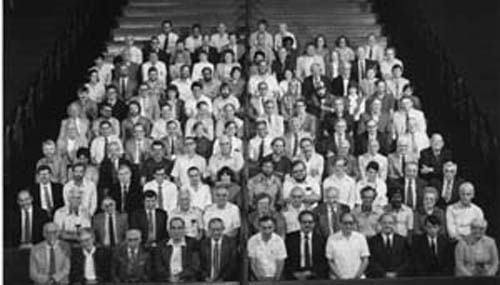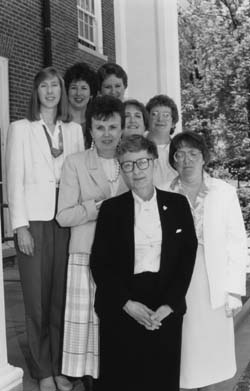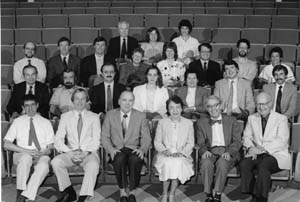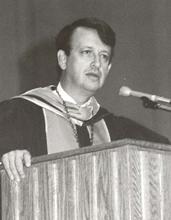
THE SESQUICENTENNIAL YEAR,
1986-1987
Pages:
1 2 3
4 5
6 Next
>>
Appendixes:
Appendix A, Appendix
B

__________________________________________________________________________
Most of the Liberal Arts Faculty and Arts
Faculty and Emeriti in the Sesquicentennial Year, 1987. Left
to right: Row 1: Warren, Beatty, Ross, Youse, Cook, Mayer,
Gibson, Mecum, Rosser, Bottoms, Falco. Row 2: James
George, Sprague, Raymond, McFarland, Fuller, Kissinger, Teeguarden,
Thomas, Gass, Dudley, Manickam, V. Williams, Morrill. Row 3:
W. Wilson, Yochum, Elrod, J. McCall, Abel, Metzger, Hazel, Smogor,
Kannowski, Gardsbane, Garriott, Gooch. Row 4: White,
Serlin, Calvert, Mays, Gammon, D. Smith, Schlotterbeck, Dittmer,
Farber, R. Harvey, E. McCall, Lovelace. Row 5: Phillips,
Stark, Eccles, Emery, M. Catanese, Brooks, Mourouzis, Erdmann,
Wright, Henninger, Turk. Row 6: Burkett, Hagaman, Moore,
Garrett, Glausser, Soster, Newton, Schwartz, Kelly, Edward Ypma, J.
Wilson. Row 7: Simmons, Shahin, Carlson, Wichser, Lemon, W.
Field, Sutton, Price, M. Johnson, C. Cornell, L. Cornell, Steinberg.
Row 8: Jagger, Evans, Hanson, Raines, A. Catanese, Coulont-Henderson,
J. Rambo, A. Rambo, Eigenbrodt, Gustavsson, Davis, Huffman. Row 9:
Ryujin, Opdahl, Goodson, Biggs, Weaver, Leverenz, Erndl, E. Welliver,
G. Welliver, S. J. Williams, C. Williams, Barnhart. Row 10:
B. Steele, Mizer, Raybern, MacPhail, Anderson, W. Gilmer, Brown,
Steinson, Chandler, Baughman. Row 11: Mannon, Shetty Curry,
D. Field, Eleanor Ypma.
____________________________________________________________________________________

______________________________________
Faculty, School of Nursing, Sesquicentennial
year
1986-87. Row 1: (from left): Ritter, Powell;
Row 2: S. Smith, Cherry, Hamilton;
Row 3: Kessler, Drew, Hart.
__________________________________________

___________________________________
Faculty, School of Music, Sesquicentennial
Year
1986-87. Left to right: Row 1: C. Johnson, D. Rizner, R.
Grocock, M. Carkeek, C. Grubb, D. Hanna.
Row 2: A. Carkeek, C. Cymerman, C. Rader, S. Lange, B. Grubb, O.
Smith, D. Ott. Row 3: S. Hanna, L. Philpott, S. Irwin, E.
Wilcox, D. Martin, M. Borschel, J. Beckel, A. Reynolds. Row 4:
t. Fitzpatrick, L. Griffitt,
L. Cerone.
_______________________________________
President
Robert G. Bottoms entered upon his new duties at the outset of the
year-long celebration of the 150th anniversary of the founding of
Indiana Asbury-DePauw University. The festivities began with a formal
opening convocation on September 5 addressed by President Paul Hardin
of Drew University. Two weeks later the university hosted 150 descendants
of the 25 original members of the board of trustees, who joined
the student body, faculty and administration and hundreds of residents
of Greencastle and Putnam County in celebrating Community Day with
a chapel program in Meharry Hall and a picnic in Bowman Park.
 
The following Friday the history department presented a special
convocation on DePauw's historical heritage, and a panel of local
alumni reminisced about student life in earlier decades in an "Evening
of Nostalgia." On Saturday morning, Barbara Blakemore '46,
Vernon Jordan '57, and Joseph Allen '59 spoke eloquently about the
value of a liberal arts education before a Parents' Weekend audience
in Kresge Auditorium.
Chancellor Emeritus Alexander Heard of Vanderbilt University gave
the principal address at the formal inauguration of President Bottoms
in a Friday morning convocation at the beginning of Old Gold Weekend
in October. Other participants in the ceremony were Chancellor Richard
Rosser, Professor Arthur Carkeek of the Music School representing
the DePauw faculty, United Methodist Bishop Leroy C. Hodapp, and
the outgoing chairman of the board of trustees, Eugene L. Delves.
The newly installed chairman of the board, Robert R. Frederick,
presented the presidential medallion to Bottoms, who made a brief
inaugural address. That evening the university instituted the DePauw
Athletic Hall of Fame, naming 25 former students and coaches as
its first members.
On Saturday morning Chancellor Rosser presided over the dedication
of the William Weston Clarke Emison Art Center, renamed to honor
the contributions of the Emison family to the university over four
generations. Professor Emeritus Jerome Hixson, former Dean Robert
Farber, and Athletic Director Tom Mont shared the podium at the
traditional Old Gold chapel in Meharry Hall. A gala musical performance
by the DePauw Symphony Orchestra and the DePauw Concert Choir and
Festival Choir concluded the festive weekend, featuring the world
premiere of a specially commissioned sesquicentennial composition
by Paul Whear '48 entitled "Old Gold -a Celebration" and
appearances by opera singer Pam Coburn '74 and guest conductor Joseph
Flummerfelt '58.
A series of special events extended throughout the academic year,
including lectures and symposia on scientific and public policy
issues. Honorary degrees were awarded to five women religious leaders
representing a broad spectrum of faith and action, Roman Catholic,
Protestant, and Jewish. In addition programs were devoted to remembering
the social idealism of the 1960s, Black Cultural Week, Women's Week,
and a Week of the Arts. Three prominent ministers delivered sermons
for "A Great Day of Preaching."
 
DePauw
also formally inaugurated the Center for Contemporary Media with
addresses and panel discussions by noted journalists. The sesquicentennial
celebration was brought to a grand conclusion, along with the sesquicentennial
financial campaign, on Alumni Weekend in June 1987, with a succession
of events culminating in an impressive display of fireworks in Bowman
Park.
In his inaugural address President Bottoms set forth three important
initiatives for his administration: (1) to bring about greater diversity
in the student body, faculty and administrative staff, and the curriculum;
(2) to give renewed emphasis to science education; and (3) to provide
moral leadership in an increasingly secularized environment. With
wide support from the DePauw constituency, he began implementation
of these goals, both by organizing task forces to plan appropriate
action and by concrete steps such as the establishment of a new
minority scholarship program and a policy of increased representation
of women and minorities on the university staff.
Back
to Top
Pages:
1 2 3
4 5
6 Next
>>
Appendixes:
Appendix A, Appendix
B
|

![]()






